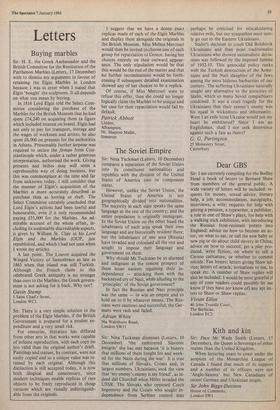Letters
Buying marbles
Sir: H. E. the Greek Ambassador and the British Committee for the Restitution of the Parthenon Marbles (Letters, 17 December) wish to dismiss my arguments in favour of retaining the Elgin Marbles in London because I was in error when I stated that Elgin 'bought' the sculptures. It all depends on what you mean by buying.
In 1816 Lord Elgin told the Select Com- mittee considering the purchase of the Marbles for the British Museum that he had spent £74,240 on acquiring them (a figure which included interest on loans). Elgin had not only to pay for transport, storage and the wages of workmen and artists; he also spent £6,000 on presents for the authorities in Athens. Presumably further largesse was required to secure the Erman from Con- stantinople which, under a rather generous interpretation, authorised the work. Giving presents and bribes may well seem a reprehensible way of doing business, but this was commonplace at the time and far from unknown today. I still consider that the manner of Elgin's acquisition of the Marbles is more accurately described as purchase than as looting or theft. The Select Committee certainly concluded that Lord Elgin's actions had been lawful and honourable, even if it only recommended paying £35,000 for the Marbles. An ad- mirable account of the whole affair, in- cluding its undeniably discreditable aspects, is given by William St. Clair in his Lord Elgin and the Marbles (OUP, just republished, and which I had not seen when I wrote my article).
A last point. The Louvre acquired the Winged Victory of Samothrace as late as 1863 when that island was still Turkish. Although the French claim to this celebrated Greek antiquity is no stronger than ours to the Marbles, the Greek govern- ment is not asking for it back. Why not?
Gavin Stamp
1 Saint Chad's Street, London WC1


































 Previous page
Previous page